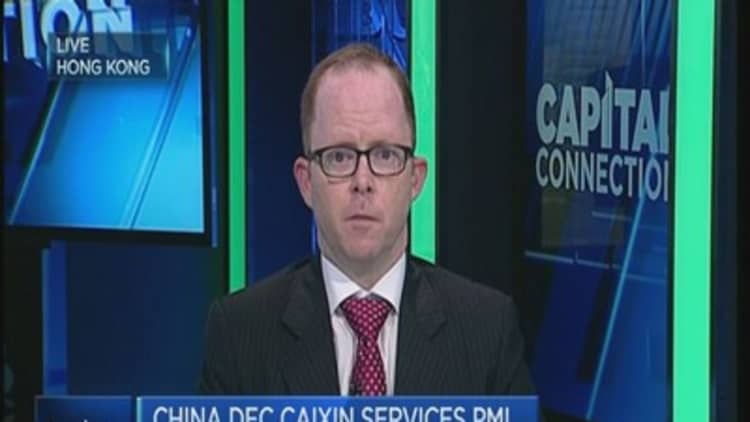Activity in China's services sector — the biggest contributor to gross domestic product — expanded at its slowest pace in 17 months in December, according to a closely-watched private survey, an indication of headwinds faced by China in its shift toward a more service-oriented economy.
The Caixin/Markit Purchasing Managers' Index (PMI) for December fell to 50.2, from November's 51.2. In October, the index hit a three-month high of 52. December's services PMI reading was the lowest since July 2014.
A number above 50 indicates activity is expanding, while one below that level indicates a contraction.
Wednesday's report was also far weaker than the government's reading of services sector activity, and comes on the heels of more downbeat factory data.
Official services PMI for December, released on Thursday, rose to 54.4, from November's 53.6, while the final Caixin/Markit manufacturing PMI contracted for the tenth straight month in December.

Services account for about half of China's GDP.
The contrast in the two sets of surveys sent "very, very mixed signals" but was not surprising, said Citigroup's head of Asia Pacific economic and market analysis, Johanna Chua.
"When the industrial sector in China is slowing down … it's hard to imagine that the tertiary services can completely decouple from what's happening in the rest of the the economy, there will always be some linkage," Chua told CNBC's Squawk Box.
Although Caixin's survey focuses on mid-size and smaller firms and the official poll covers larger ones, recent information and data out of China suggested that the economic picture was still "very challenging" she added.
Caixin Insight Group's chief economist He Fan said that, in light of what appeared to be a setback to services sector growth, Beijing needed to gradually relax restrictions on the sector.
Services activity data, which tracks consumer industries such as real estate, retail and leisure, has not always attracted widespread attention, but investors are increasingly focused on the numbers as the sector becomes crucial to Beijing's rebalancing act from a manufacturing-led to services-oriented economy.
President Xi Jinping's administration has sought to replace investment and exports with consumption as the mainland's key growth driver, and recent data had indicated healthy progress so far.
Despite lackluster data recently, Brett McGonegal, the chief executive of investment firm Reorient, said the company was still positive on China's move from its old, manufacturing-driven economy to the new world of IT and services.
'We are starting to really understand the timeline that is going to take for people to understand this transformation and we think it's been primarily missed," Brett McGonegal told CNBC's Street Signs.
China is due to report its fourth quarter and full-year GDP on January 19.


